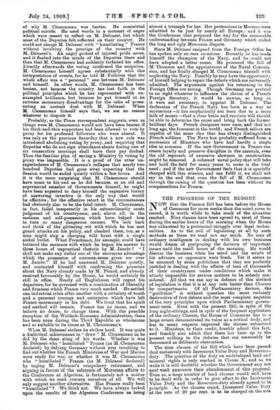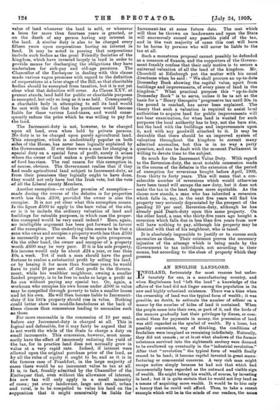THE PROGRESS OF THE BUDGET. N OW that the Finance Bill
has been before:the House of Commons for more weeks than the mind tares to record, it is worth while to take stock of 'the, situation reached. Nine clauses have been agreed; to most of them during the earlier hours of the morning when: the House was exhausted by a protracted struggle over : legal techni- calities. As to the evil of legislating at all by such methods as these- we need not say much. No man of ordinary intelligence in dealing with his own business would dream • of postponing the decision of important issues until the small hours of the morning. He would discuss the business when his mind and the minds of his advisers or opponents were fresh. Yet it seems to be assumed by some politicians that they are perfectly justified in: dealing with the affairs of tens of thousands of their countrymen under conditions which make it utterly impossible for serious matters to be soberly con- sidered. All that we can say in defence, of this method of legislation is that it is at any rate better than Closure by compartments. Of all Parliamentary devices, the ‘‘ guillotine " is without question the most certainly destructive of free debate and the most complete negation of the very principles upon which Parliamentary govern- ment rests. Even with the present Bill, in' spite of the long night-sittings, and in spite of the frequent application of the ordinary Closure, the House of Commons has to a large extent demonstrated its value as a critical body, and. i has n many respects improved the clauses submitted to it. Ministers, to their credit, frankly admit this fact, and frankly also admit that there has been up to the present nailing in the debates that can reasonably be denounced as deliberate obstruction.
The nine clauses of the Bill which have been passed deal exclusively with Increment Value Duty and. Reversion- duty. The question of the duty on undeveloped land. and mineral rights is only reached in Clause X., and as we write it is 'still doubtful whether the Government may not next week announce their abandonment of this proposal. Even so, a large number of land. clauses would still have to be dealt with in order to give effect to the Increment Value Duty and. the Reversion-duty already agreed to in principle. As the clauses stand, Increment Value Duty at-the rate of 20 per cent. is to be charged'-on- the site
value of land whenever the land is sold, or whenever a lease for more than fourteen years is granted, or on the death of any person having any interest in the land. A similar duty is also to be charged every fifteen years upon corporations having an interest in land. It may be noted in passing that corporations include such bodies as the great Friendly Societies of the kingdom, which have invested largely in land in order to provide means for discharging the obligations they have undertaken for sick-pay and old-age pensions. The Chancellor of the Exchequer in dealing with this clause made various vague promises with regard to the definition of corporations at a later stage of the Bill, so that charitable bodies should be exempted from taxation, but it is not yet clear what that definition will cover. As Clause XXV. at present stands, land held for public or charitable purposes is exempted, but only so long as it is so held. Consequently a charitable body in attempting to sell its land would be met with the fact that the purchaser would become liable for these various Land-taxes, and would conse- quently reduce the price which he was willing to pay for the laud.
The Increment-duty is not, however, to be charged lupon all land, even when held by private persons. No duty is to be charged upon purely agricultural land. This exemption, which is undoubtedly popular on both sides of the House, has never been logically explained by the Government. If ever there were a case for charging a special duty on a special form of profit, surely it arises where the owner of land makes a profit because the price of food has risen. The real reason for this exemption is, of course, obvious. The Government realise that if they had made agricultural land subject to Increment-duty, as from their premisses they logically ought to have done, they would not only have lost the Irish vote, but the vote of all the Liberal county Members.
Another exemption—or rather promise of exemption— made during the course of the debates is for properties worth less than .£500, provided the owner is also the occupier. It is not yet clear what this exemption means. Is the figure £500 to apply to the bare value of the site, or is it to include the ordinary valuation of land and buildings for rateable purposes, in which case the proper- ties exempted would be very small indeed ? Here, again, /no intelligible argument has been put forward in favour of the exemption. The underlying idea seems to be that a man who owns and occupies a property worth less than £500 is necessarily a poor man. He may be quite prosperous. On the other hand, the owner and occupier of a property worth £600 may be very poor. If it is his sole property, Lis income would only be about £24 a year, or less than 10s. a week. Yet if such a man should have the good fortune to realise a substantial profit by selling his land, or by leasing it for more than fourteen years, lie would Lave to yield 20 per cent. of that profit to the Govern- ment, while his wealthier neighbour, owning a smaller landed property, is to be free to make as large a profit as he can without paying any special tax. Or, again, a workman who occupies his own house under £500 in value may be compelled through poverty to take a smaller house and let his own. He will then become liable to Increment- duty if his little property should rise in value. Nothing could better show the muddle-headedness at the back of these clauses than concessions leading to anomalies such as these.
Far more reasonable is the concession of 10 per cent. before any Increment-duty is charged at all. This is logical and defensible, for it may fairly be argued that it is not worth the while of the State to charge a duty on small increments. This concession, however, must neces- sarily have the effect of immensely reducing the yield of the tax, for in practice land does not normally grow in value at a very rapid rate. Indeed, if interest were allowed upon the original purchase price of the land, as by all the rules of equity it ought to be, and as it is in the famous case of Frankfort, in the large majority of cases there would be no increment value to tax at all. It is, in fact, frankly admitted by the Chancellor of the Exchequer that, even without the allowance of interest, Lie new tax will only apply in a small minority of eases; yet every landowner, large and small, urban and rural, is to be compelled to value his land on the supposition that it might conceivably be liable for
Increment-tax at some future date. The cost which will thus be thrown on landowners and upon the State will enormously exceed any possible yield of the tax, and in the vast majority of cases this cost will have to be borne by persons who will never be liable to the tax at all.
Such a monstrous proposal cannot possibly be defended as a measure of finance, and the supporters of the Govern- ment frankly confess that their only motive is to secure a universal valuation of all the land of the kingdom. Mr. Churchill at Edinburgh put the matter with his usual directness when he said : "We shall procure an up-to-date Domesday Book showing the capital value, apart from buildings and improvements, of every piece of laud in the kingdom." What practical purpose this "up-to-date Domesday Book" is to serve, unless it be to act as the basis for a "Henry Georgeite" progressive tax until 20s. in the pound is reached, has never been explained. The theory that such a valuation is required to assist lo3a1 authorities to acquire laud for public improvements will not bear examination, for when land is wanted for such purposes the local authority has to buy, not the bare site, but the land with the buildings and improvements upon it, and with any goodwill attached to it. It may be desirable that there should be an improved system of valuation throughout the kingdom to correct many admitted anomalies, but this is in no way a party question, and can be dealt with the moment Parliament is willing to devote time to the subject.
So much for the Increment Value Duty. With regard to the Reversion-duty, the most notable concession made in the course of the debates is the extension of the period of exemption for reversions bought before April, 1909, from thirty to forty years. This will mean that a con- siderable number of reversions which would otherwise have been taxed will escape the new duty, but it does not make the tax in the least degree more equitable. As the clause now stands, a man who has inherited a reversion which falls in, say, in the next five years will find his property very seriously depreciated by the prospect of the pending 10 per cent. Reversion-duty, although he has already paid Death-duty upon this same property. On the other hand, a man who thirty-five years ago bought a reversion which falls due in less than five years from now will have nothing to pay, although his property may be identical with that of his neighbour, who is taxed.
It is absolutely impossible to justify or to excuse such anomalies as these. Their existence proves the necessary injustice of the attempt which is being made by the Government to tax individuals, not according to their means, but according to the class of property which they possess.



































 Previous page
Previous page